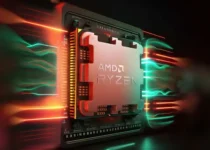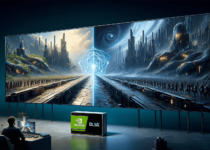Desktop VS Laptop: 12 Differences Explained
In the initial days of computers, they were expensive devices, large, and performed less accurately. However, a lot has changed in the modern day, and computers are now universally accessible standard devices.
While desktop desktops and laptops can be referred to as computers, there are some differences between the two. You can find all the information you need to compare laptops and desktops on one page.
In addition to the distinctions between desktops and laptops, there are also certain commonalities. They are also located here. This is a list of applications for laptops.
A brief overview of laptop and desktop computers is in order.
- A desktop computer is a typical computer with a CPU, monitor, keyboard, and mouse, all of which are connected by wires.
- A laptop is a condensed form factor for a PC. Thus, cables such as HDMI, DisplayPort, etc. are not necessary. However, these cords are required if you wish to connect a display to your laptop.
Desktop VS Laptop
These are among the most typical factors that we should think about before making a computer purchase. After reading the following comparison, you’ll undoubtedly choose which kind of computer—a laptop or a desktop—is better for you and your line of work.
Furthermore, I can provide you with entirely objective information in this regard.
- Custom PC build:
A PC build is the first item we must take into account. The ones that we can construct on our own are desktop computers. But we are unable to construct a laptop. Compared to the
components of a desktop PC, those of a laptop are smaller and more sensitive. Thus, the desktop PC is superior to the laptop in this regard. We have complete control over the system specs and component prices.
A PC construction guide is available here. This article will assist you if you want to build your PC.
- Hardware Components:
As far as we are aware, a computer consists of a variety of physical parts, including the motherboard, processor, memory, ROM, keyboard, and so forth. Not every PC user, however, needs all of the PC’s components. Learn everything there is to know about PC parts. For you to decide which to purchase and which to disregard.
Nonetheless, we discover that practically every PC component is equivalent for both desktop and laptop computers. However, the technique is not the same. What I’m trying to say is that a desktop PC’s component size is larger than a laptop’s.
Integrated Circuit technology is used in the design of the laptop PC components. They do take up very little room. The physical structure of the same component varies between the two systems, though. They have a variety of benefits and drawbacks because of this.
- Software Performance:
When it comes to performance, a desktop computer outperforms a laptop because of limitations on the laptop’s components, such as constrained PC fan cooling. The greatest solutions for fixing an overheating PC can be found here.
A computer will operate at its peak efficiency the more cooling it receives. In that scenario, adding more fans to laptops does not optimize PC airflow.
In actuality, a desktop computer outperforms a laptop with an identical system configuration. An integrated circuit motherboard typically offers greater potential than a conventional motherboard.
- Power Consumption:
In comparison to a laptop, a desktop PC uses more electricity. This is due to the bulky nature of desktop PC components and the extra needs they have, such as higher-standard UPS, RGB fans, and more PC fans. These all demand more power.
What is the power consumption of a gaming laptop, given that an average computer uses 200 Watts.
A laptop can be powered by either AC or DC, while a desktop computer requires AC power to operate.
- Component Replacement:
With a desktop PC, component replacement is completely flexible. A computer’s parts can be changed in two different ways.
- When a CPU cabinet component is destroyed
- When you wish to improve the characteristics of your PC
On desktop PCs, we can change a component on our own in both situations. However, with laptops, we can modify the settings in fewer instances and repair a damaged component at a higher risk
Details on the components in your PC can be found under system information.
6. Carry Ability:
Even if a desktop computer includes many parts, it is difficult to carry them all at once. However, we feel completely at ease taking a laptop with us at all times.
For many office workers and vacationers, etc., this is quite helpful.
7. Maintenance:
Dust particles require routine cleaning of desktop computers. We must open the central processing unit’s case and thoroughly clean its internal parts at least once every six months
You shouldn’t disregard this task even if your surroundings are clean since dust is an extremely tiny particle that makes it difficult to determine when and how much of it will enter your CPU.
The laptop needs to be well maintained as well. However, laptop maintenance is simpler than that of a desktop computer.
The same thing is accomplished by an IO shielding in a computer (blocking the dust).
8. Internal Drives:
A desktop PC’s internal storage drives can be stored in numerous slots, depending on the motherboard and CPU cabinet, on a hard disk, SSD, or M.2. Increasing the internal drive capacity on a desktop computer is therefore very helpful to us.
Nevertheless, since every internal component of a laptop computer is made to fit under a designated space, it is not feasible. Therefore, there is no way to insert the exterior parts into it.
In comparison to other storage devices like SSDs, M.2s, Pendrives, etc., a hard disk takes up more space.
9. External Drives:
Both can accommodate external drives, including pen drives, external hard drives, keyboards, and mice, among other things.
Everything is dependent upon the kind of ports a motherboard in a system contains. This is another explanation for why a computer’s motherboard is one of its main parts.
10. Gaming:
Without question, a desktop computer outperforms a laptop when it comes to gaming. We can get gaming laptops these days, but when you have to choose between a desktop PC and a gaming laptop, you must choose the desktop for the following reasons.
- The desktop computer is colorful and runs well enough for you to make you own.
- You can have total control over price management
- You may upgrade my PC’s specifications if you want to choose.
11. User-Friendliness:
There are benefits and drawbacks to both devices in terms of use.
Although a desktop PC is portable and has a vibrant configuration with RGB lighting, it is not very portable. With the monitor, we shouldn’t cut corners. If necessary, we can replace it.
We cannot discover the same vibrant appearance on laptops as on desktop PCs. We are unable to swap out one laptop screen for another. We can use a laptop screen on an additional monitor instead. We can bring it by our needs.
12. Cost:
When compared to desktops and laptops, the product’s price is one of the most crucial considerations.
On a desktop computer, we get to select every component; but, on a laptop, the manufacturer sets the specifications for the system. Thus, we are unable to determine a product’s price.
We do have the option to select another laptop, though, if the pricing doesn’t meet our needs.
What’s the best choice?
The laptop will typically cost more even if the specifications of a computer with a desktop and a laptop are identical. In addition to costing more than desktop computers, top-tier laptops come with each of the aforementioned drawbacks. Because they can be used for more than just education, high-end laptops are still a fantastic investment considering that they can be utilized for gaming and streaming.
A distance learning student can use a top-of-the-line desktop more frequently, and parents can afford to pay less for it upfront. Expanding the PC can eventually be a costly and time-consuming procedure, but it doesn’t have to cost a fortune upfront.
It all comes down to the individual needs of the student and the buyer’s overall budget. If portability isn’t a must, buying a PC is the best option.
But keep in mind that there are situations where a desktop computer may be more affordable than a laptop.
Conclusion
In conclusion, I would want to state that nothing exceptionally bad is happening here. Whether you need a laptop or a desktop, you can select the one that is best for you depending on your line of work.
For optimal gaming performance and streaming, a player needs a desktop PC. Additionally, because a laptop is convenient for his job, photographers utilize them.


